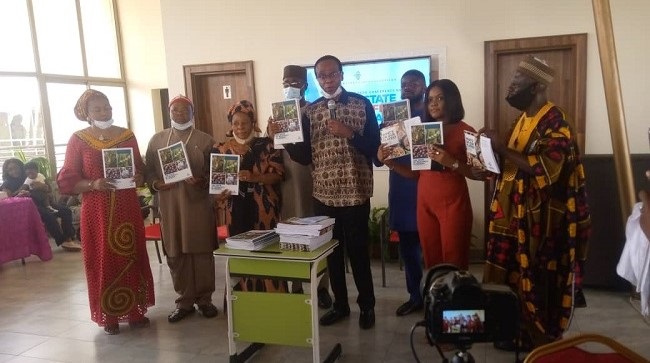Deliberations at a physical and virtual conference on “The State of Biosafety in Nigeria” covered regulatory issues, biosecurity, food and farming systems, hunger as well as risky technologies such as gene-editing, synthetic biology, nanotechnology, robots and 3D food printing.

The conference was hosted by the Health of Mother Earth Foundation (HOMEF) on Tuesday, April 13, 2021 in Abuja. Participants at the event included stakeholders such as smallholder farmers and food processors, environmental justice and food sovereignty advocates, medical and legal practitioners, biosafety experts, the academia and the media.
The deliberations were facilitated by Nnimmo Bassey, director of HOMEF; Ifeanyi Casmir, a medical and molecular microbiologist who has carried out extensive researches on biosafety and biosecurity; Ifeanyi Nwankwere, a lawyer and human rights advocate with particular interest in food and biosafety issues; Joyce Ebebeinwe, HOMEF’s programme manager leading the hunger politics desk; Mariam Mayet, founder of the African Centre for Biodiversity in South Africa; and Vandana Shiva, an environmental activist, food sovereignty advocate and ecofeminist.
The highlight of the event was HOMEF’s launching of a report titled “The State of Biosafety in Nigeria” addressing the situation of biosafety in the country. The report centres on biosafety with regards to Genetically Modified Organisms (GMOs), their use, official and illegal release, and the level of public awareness of the subject.
It also reviewed Nigeria’s biosafety regulatory system and analysed the implementation of biosafety principles. The report reveals that, as of November 2020, the National Biosafety Management Agency (NBMA) has issued 19 permits for the introduction of GMOs into Nigeria. Eight of these GMOs were designated for field trial, nine for direct use for food and/or feed processing and two (that is, GM Cowpea/beans and GM cotton) for commercial release.
The Biosafety report, thus, exposes the fundamental flaws and gaps in the NBMA Act of 2015. Among these flaws is the defective provision for liability and redress. Another flaw is the fact that NBMA has on its board the National Biotechnology Development Agency (NABDA) which it is meant to regulate, giving room for conflict of interest. The report presents recommendations targeting policy review and to engender needed actions.
Also launched was “What’s on Our Plate?” report which shows the prevalence of GMO products in Nigeria. The report is the output of market shelf surveys carried out by HOMEF from 2018 to 2020. It revealed the presence of over 30 products with genetically modified ingredients or that are made from genetic engineering on the shelves of supermarkets in Nigeria without any sign of their entry being authorised.
According to Joyce Ebebeinwe, the survey was motivated by NBMA’s constant rebuttal of the presence of GMO products in the Nigerian market and the need to protect our food system and ensure biosafety.
Ifeanyi Casmir explained: “Biosafety was said to entail actions, systems and policies that place premium on the protection and safety of people and the environment from exposure to harmful biological agents. It entails the risk assessment of unintentional acts that impact the environment negatively.”
Compromises in biosafety laws and regulations of a nation, exposes such a nation to biosecurity challenges. Ifeanyi Nwankwere mentioned a clause in the NBMA Act which allows for the Agency to receive gifts from people. He considers this as a compromising element which allows for regulatory capture and by implication corruption.
The negative impact would also be felt on the food and farming systems of the nation in which small scale food producers like farmers, herders and fishers play the most vital roles. According to Nnimmo Bassey, small farmers, herders, and fishers who account for about 70 percent of the global food supply are among the most vulnerable to food insecurity which is worsened by a flawed biosafety structure.
These small holder food producers are often denied support and facilities necessary for their productivity and livelihoods. Then there is induced hunger perpetuated by lack of policy supports. “There is enough food in the world to feed everyone, but sadly about a third of available foods either go to the waste bin or get spoilt while in storage,” Bassey stated.
Mariam Mayet considers the plight of small scale farmers as not peculiar to Nigeria especially in terms of seeds and land right. According to her, the struggle for farmers to use and protect their own seed is a continent-wide struggle as these seeds are often demonised across the African continent as farmers are cajoled to patronise seed companies.
This is connected to the commodification of food which according to Vandana Shiva places no limit on big corporations’ hunger for land grabbing and hampers food sovereignty. These corporations are the ones pushing technologies such as geoengineering and those previously mentioned. Vandana Shiva enjoined the stakeholders to question the adoption of these technologies emphasising that food sovereignty is dependent on learning from our ancestors not on the technologies.
At the end of the conference, stakeholders came up with resolutions stressing first, the need for a total overhaul of the biosafety regulatory architecture in Nigeria considering the overwhelming gaps and flaws in the current NBMA Act.
Second, the need to scrap the current gene editing guidelines that can label gene edited organisms as non-GMOs, thus, allowing approval of such organisms without regulation or public consultation. And third, the need to stop the introduction of GMOs into Nigeria and to preserve the nation’s natural seed varieties plus genetic resources.
Some other resolutions covered the need to support farmers with needed storage and processing facilities, market and extension services to ensure optimum productivity and build capacity of the media to be able to adequately report biosafety issues.
